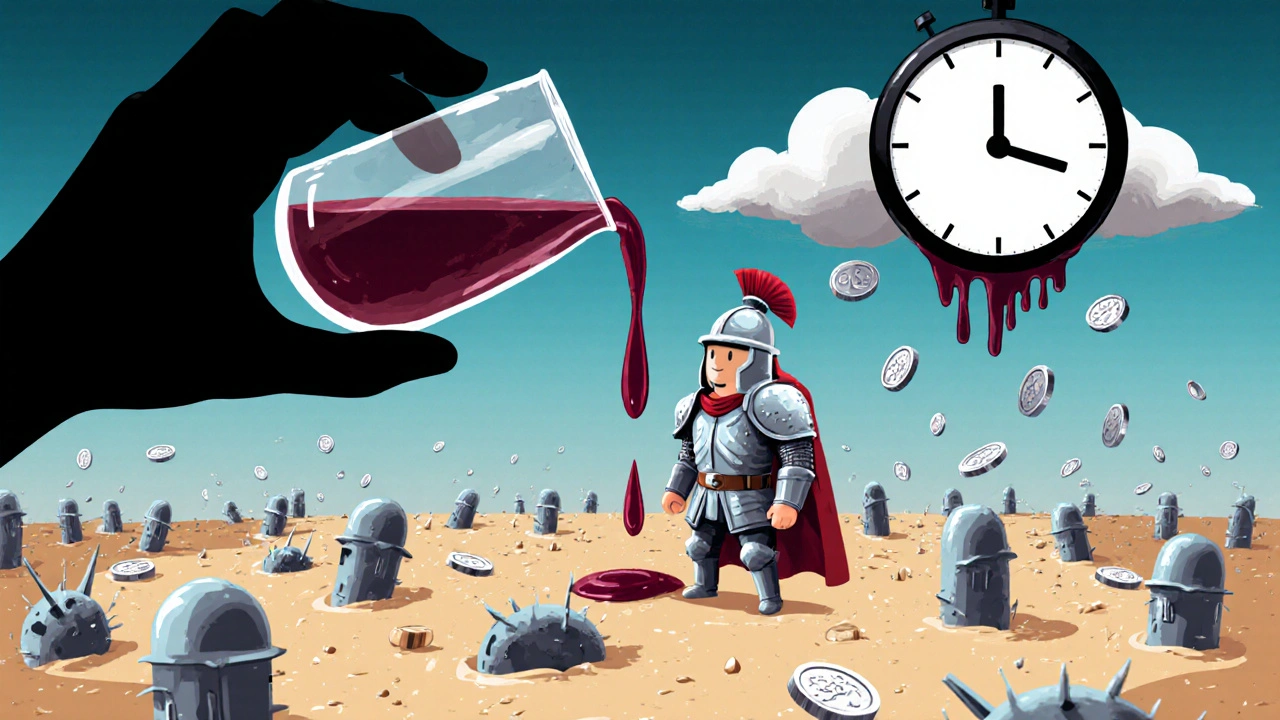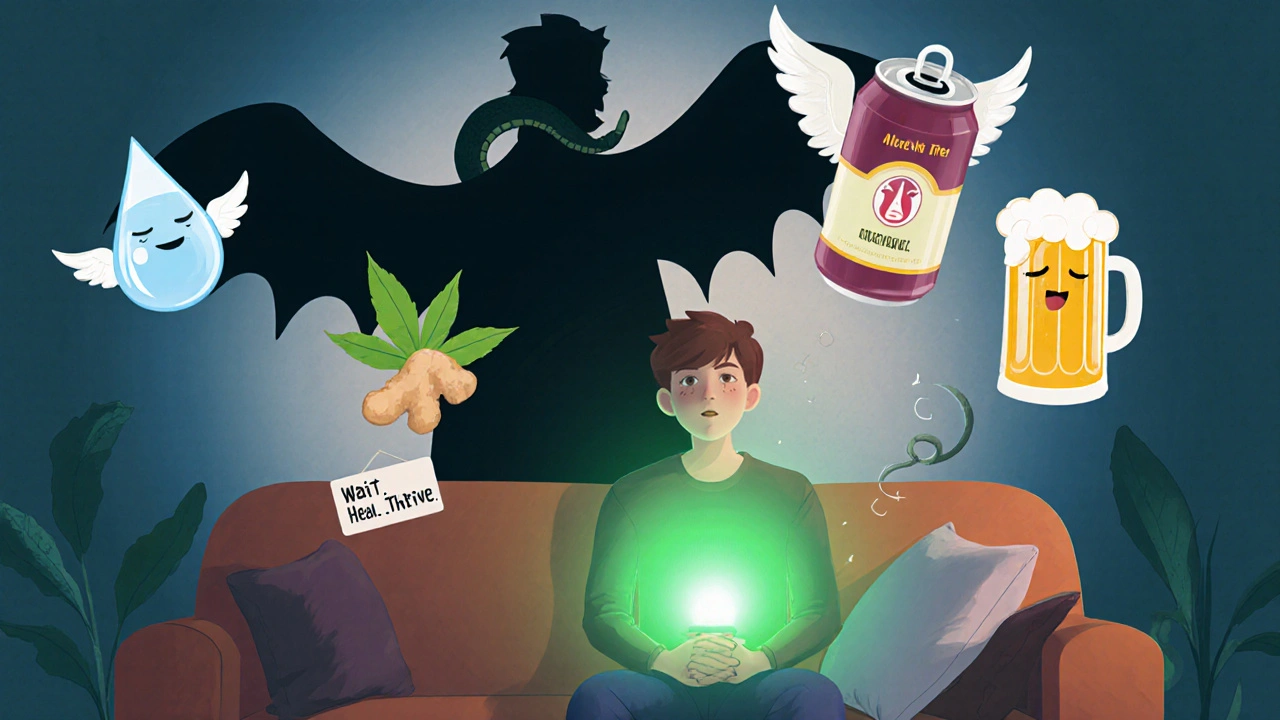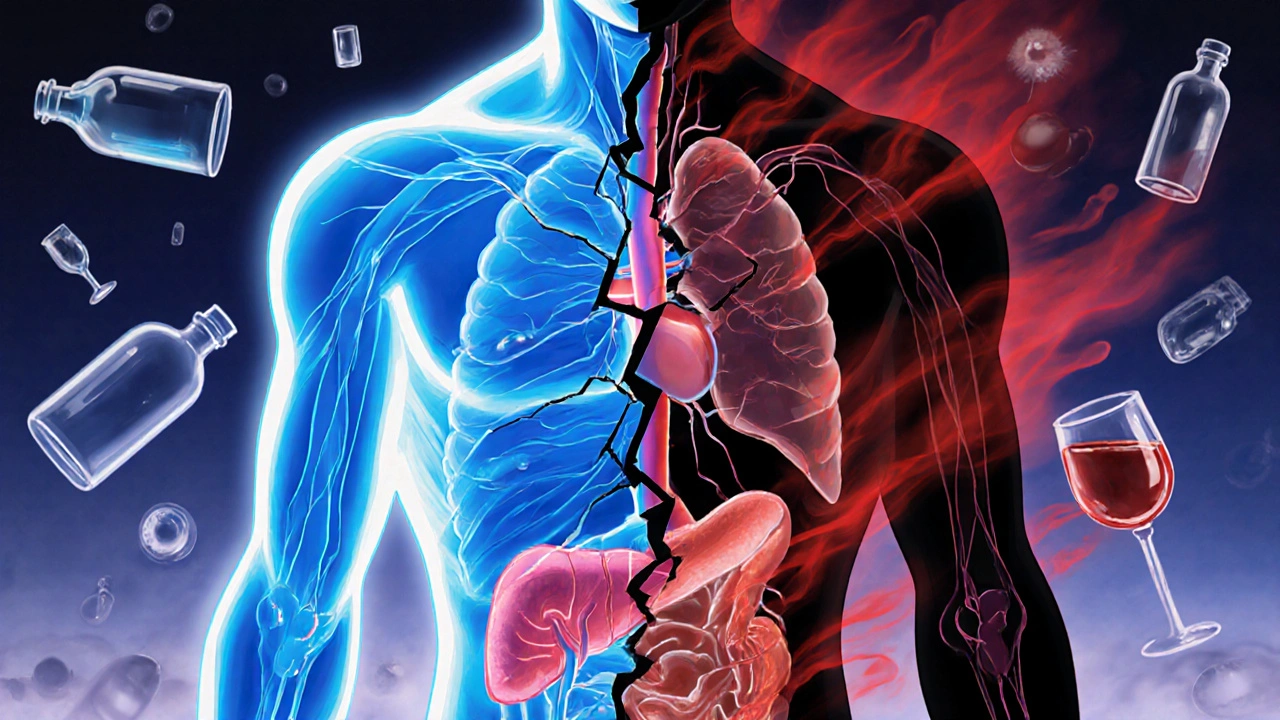Drinking alcohol while taking trimethoprim might seem harmless-after all, it’s just a simple antibiotic, and you’ve had a glass of wine with other meds before. But here’s the truth: mixing trimethoprim and alcohol isn’t just a myth. It can make you feel worse, delay healing, and in rare cases, trigger serious reactions you didn’t see coming.
What is trimethoprim?
Trimethoprim is an antibiotic used to treat bacterial infections like urinary tract infections (UTIs), bronchitis, and some types of ear infections. It’s often combined with sulfamethoxazole as co-trimoxazole, but it’s also prescribed alone. It works by blocking the bacteria’s ability to make folic acid, which they need to grow and multiply. Humans get folic acid from food, so trimethoprim doesn’t affect us the same way-but it still messes with your body’s balance.
It’s usually taken once or twice a day for 5 to 14 days, depending on the infection. Most people tolerate it well, but side effects like nausea, dizziness, or rash can happen. And when you add alcohol into the mix, those side effects don’t just stay the same-they get worse.
How alcohol affects trimethoprim
Alcohol doesn’t directly cancel out trimethoprim’s ability to kill bacteria. But it does something more subtle-and more dangerous. Your liver has to process both substances at the same time. When it’s busy breaking down alcohol, it slows down how fast it clears trimethoprim from your system. That means the drug stays in your blood longer than it should.
This can lead to higher-than-intended levels of trimethoprim in your body. That increases your risk of side effects: headaches, dizziness, confusion, or even a drop in blood pressure. You might feel more tired than usual, or get a sudden wave of nausea after just one drink. For someone already fighting an infection, that extra stress on the body can slow recovery.
There’s also a small but real risk of a disulfiram-like reaction. This isn’t common with trimethoprim alone, but it’s been reported in rare cases when combined with alcohol. Symptoms include flushing, rapid heartbeat, nausea, vomiting, and low blood pressure. It’s not life-threatening in most cases, but it’s terrifying if you’re not expecting it.
What happens to your body when you mix them
Your body is already working overtime when you’re sick. Your immune system is firing on all cylinders, your liver is filtering toxins, and your kidneys are clearing waste. Add alcohol to that, and you’re forcing your organs to handle even more.
Alcohol dehydrates you. Trimethoprim makes you urinate more. Together, they can push you into dehydration faster than you realize-especially if you’re not drinking enough water. Dehydration can make UTIs worse, cause dizziness, and even lead to kidney stress.
Alcohol also suppresses your immune system. A 2023 study in the Journal of Infectious Diseases showed that even moderate drinking (one or two drinks) reduced white blood cell activity by up to 20% in the 24 hours after consumption. That’s bad news if you’re trying to fight off a bacterial infection. You’re not just slowing your recovery-you’re giving the infection more room to spread.
And then there’s the gut. Trimethoprim can upset your stomach. Alcohol irritates your stomach lining. Combine them, and you’re looking at a higher chance of vomiting, diarrhea, or abdominal pain. Some people report a metallic taste in their mouth or loss of appetite-both are signs your body is struggling to cope.

How much alcohol is safe?
The short answer: none. But if you’re asking because you’ve already had a drink, here’s the realistic picture.
There’s no official “safe” amount of alcohol while taking trimethoprim. Doctors don’t give guidelines because the risk isn’t linear-it’s unpredictable. One person might drink a beer and feel fine. Another might get dizzy after half a glass of wine.
Here’s what most pharmacists and infectious disease specialists agree on:
- If you’re treating a UTI or respiratory infection, avoid alcohol entirely until you’ve finished your course.
- If you’re feeling unwell, tired, or nauseous already, alcohol will only make it worse.
- Even one drink can increase your risk of dizziness or low blood pressure, especially if you’re older or taking other meds.
- Don’t wait until the last day to drink. The interaction can happen at any point during treatment.
Some people think, “I’ll just have one glass on the weekend.” But antibiotics like trimethoprim don’t work on a schedule. They’re active in your system every hour, every day. You’re not just risking a hangover-you’re risking your recovery.
What to do if you’ve already mixed them
If you drank alcohol while on trimethoprim and now feel dizzy, nauseous, or your heart is racing, stop drinking immediately. Drink water. Sit down. Don’t drive or operate machinery. Call your doctor or pharmacist if symptoms last more than an hour or get worse.
Most reactions are mild and go away on their own. But if you experience chest pain, trouble breathing, or severe vomiting, seek medical help right away. These are rare, but they’re not impossible.
Don’t panic if you had one drink. Many people do. The key is to stop now and monitor how you feel. Don’t try to “push through” the symptoms. Your body needs rest, not more stress.
Alternatives and what to drink instead
While you’re on trimethoprim, focus on hydration and healing. Water is your best friend. Herbal teas like chamomile or ginger can soothe your stomach. Cranberry juice (unsweetened) is often recommended for UTIs-it doesn’t cure them, but it can help flush bacteria out.
If you miss the taste of alcohol, try alcohol-free beers or sparkling water with lime. Many people find they don’t miss alcohol as much as they thought once they’re feeling better. And if you’re taking trimethoprim for a recurring UTI, cutting back on alcohol long-term might actually help prevent future infections. Alcohol increases sugar intake and dehydrates you-both factors linked to more frequent UTIs.

Who’s at higher risk?
Some people are more likely to have bad reactions:
- People over 65-liver and kidney function slows with age
- Those with liver disease or kidney problems
- Anyone taking other medications like blood pressure pills or diabetes drugs
- People with a history of alcohol use disorder
- Women-due to lower body water content, alcohol concentrations stay higher
If any of these apply to you, the advice is even clearer: skip alcohol completely.
What your doctor won’t always tell you
Most doctors assume you’ll follow the warning label. But in real life, many patients don’t. A 2024 survey in Australian primary care clinics found that 41% of patients taking antibiotics admitted to drinking alcohol during treatment. They didn’t think it mattered-or they forgot.
Doctors don’t always bring it up because they assume patients know. But if you’re unsure, ask. It’s not a judgment. It’s a safety check.
And here’s something else: trimethoprim can lower your folate levels. Alcohol does too. Together, they can cause a drop in red blood cells, leading to fatigue, pale skin, or shortness of breath. This is rare, but it’s something your doctor can check with a simple blood test if you’re feeling unusually tired.
Final advice: Play it safe
Trimethoprim is a useful, effective antibiotic. But like all medications, it’s not meant to be mixed with other substances unless you know the risks. Alcohol isn’t just a social drink-it’s a chemical that interacts with your body’s systems in ways you can’t always predict.
Don’t risk your recovery. Don’t gamble with your health. If you’re taking trimethoprim, skip the alcohol until you’re done. You’ll feel better faster. Your body will thank you.
Can I have one beer while taking trimethoprim?
It’s not recommended. Even one beer can slow how your body processes trimethoprim, increase side effects like dizziness or nausea, and reduce your immune system’s ability to fight the infection. It’s not worth the risk-especially when you’re trying to get better.
How long after finishing trimethoprim can I drink alcohol?
Wait at least 48 hours after your last dose. Trimethoprim stays in your system for about 24 to 48 hours after you stop taking it. Giving your body that extra time ensures the drug is fully cleared before introducing alcohol. If you’re still feeling unwell, wait longer.
Does alcohol make trimethoprim less effective?
Alcohol doesn’t directly make trimethoprim less effective at killing bacteria. But it weakens your immune system, dehydrates you, and stresses your liver-all of which can slow your recovery. So while the drug still works, your body can’t do its part to heal.
What are the signs of a bad interaction?
Signs include severe dizziness, rapid heartbeat, flushing, nausea, vomiting, low blood pressure, or confusion. These can happen within minutes to hours after drinking. If you experience any of these, stop alcohol immediately and contact a healthcare provider.
Is trimethoprim safe with wine or spirits?
No. The type of alcohol doesn’t matter. Whether it’s wine, beer, or spirits, the ethanol in all of them interacts the same way with trimethoprim. The risk isn’t about the drink-it’s about the alcohol content and how it affects your body.


Vivek Mishra
Actually, the study they cited? Totally misinterpreted. Alcohol doesn’t suppress immunity that much in real-world doses. I’ve had three beers with trimethoprim and felt fine. Stop fearmongering.
thilagavathi raj
ALCOHOL + TRIMETHOPRIM = LIVER APOCALYPSE. 🚨 This isn't just "feel a little dizzy"-it's hepatotoxic synergy. Your body's phase I metabolism is screaming for mercy. You're not just drinking-you're performing biochemical suicide. #PharmacologyFacts
Sandridge Neal
Thank you for this clear, science-backed breakdown. It’s so important to understand that antibiotics aren’t just "pills you take"-they’re part of a complex physiological system. Staying hydrated, avoiding alcohol, and giving your body space to heal isn’t about restriction-it’s about respect for your health. You’ve done a great job explaining why this matters.
Diane Thompson
LMAO why is everyone acting like this is new info? I’ve been on antibiotics since I was 12 and drank wine every time. Never died. Also, cranberry juice? That’s for grandmas with UTIs. Just drink water and chill.
Helen Moravszky
Yesss!! I was just about to say this-my doc never mentioned the folate thing and I was so tired I thought it was the infection. Turns out it was the combo of alcohol and trimethoprim. I stopped drinking and started eating spinach and lentils and wow, my energy came back. You’re right-your body needs rest, not more stress. Thanks for the reminder 💪
Reginald Matthews
Interesting point about the liver processing both. I wonder if there’s data on how much alcohol delays clearance-like, is it 10% slower with one drink, or 50% with three? Also, does timing matter? Drinking before vs. after the dose?
Debra Callaghan
If you drink alcohol while on antibiotics, you’re not just being irresponsible-you’re being selfish. You’re risking your own recovery and possibly spreading infection longer because you’re too lazy to wait a few days. Grow up.
Mitch Baumann
…and yet, the literature on disulfiram-like reactions with trimethoprim is… *extremely* limited. Case reports, yes. Meta-analyses? No. The real issue here is the conflation of correlation with causation. Also, I’ve noticed the author uses ‘you’ aggressively. Tone-deaf. 🤔🍷
Samuel Wood
Wait-so you’re saying I can’t have a glass of wine while on this? Bro I’ve been doing this for years. Also, you spelled ‘sulfamethoxazole’ wrong. 🤦♂️
ridar aeen
Everyone’s overreacting. I live in Cape Town, I drink wine with my antibiotics all the time. My body knows what it’s doing. Also, your article is too long. I read the first paragraph and got the point. Stop lecturing.
Sandridge Neal
Thank you for raising the point about individual variability. You’re absolutely right-some people metabolize drugs differently based on genetics, liver health, and even gut microbiome. That’s why blanket advice is tricky. Still, the safest approach remains abstinence during treatment. We can acknowledge nuance without downplaying risk.